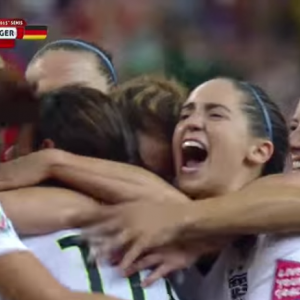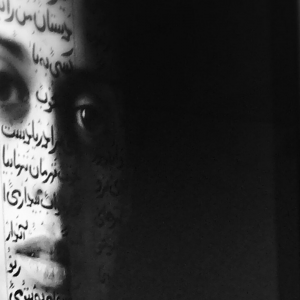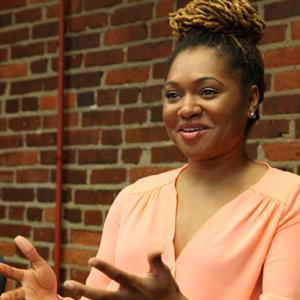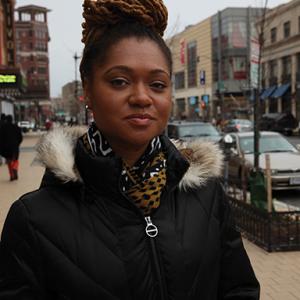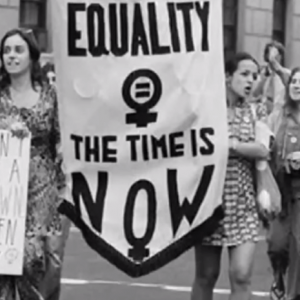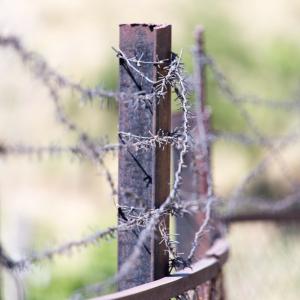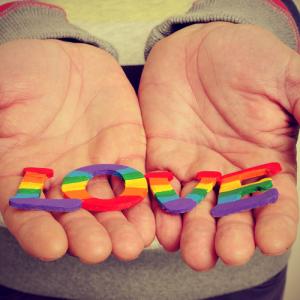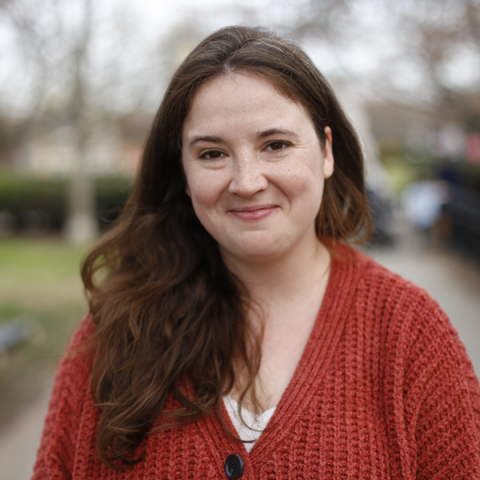
Jenna Barnett (@jennacbarnett) is the culture editor at Sojourners and the producer of the award-winning podcast Lead Us Not. She was born in San Antonio and lives in San Diego. She has a B.A. in sociology and religion from Furman University and an M.F.A in Literary Reportage from New York University.
Before joining the Sojo team, Jenna managed the International Rescue Committee’s urban gardens in San Diego, and worked as a writer for the Women PeaceMakers Program at the Kroc Institute for Peace and Justice.
She has written for McSweeney’s, Texas Monthly, the Belladonna, and New York Magazine’s Grub Street. You’re likely to find her playing basketball, watching women’s soccer, eating homemade flour tortillas, or taking her time in Scrabble.
Some Sojourners articles by Jenna Barnett:
Culture:
Brandi Carlile’s Radical Gospel of Gentleness
“What I'm talking about is radical, filthy, trembling, scary, life-changing, beautiful forgiveness,” the Grammy-winner told Sojourners in an interview.
Snorting Nutmeg at Vacation Bible School with Lucy Dacus
Her album Home Video could have just as easily been named “Youth Group” or maybe “Adventures in Suburbia.”
Features:
How Do We Recover When Our Leaders Betray Us?
Charismatic leaders like Jean Vanier can inspire our faith — or make it fall apart.
Let There Be Light
When sexual abuse occurred in their church, Rev. Heidi Hankel and her congregation refused to let it stay hidden.
Humor:
Footprints in the Sand (Unedited)
Lord, when I needed you most, why were you snacking on Flamin' Hot Cheetos?
John the Baptist’s Recipe for Honey-Crisped Locusts
Once the locusts are as hot as a wealthy hypocrite burning in hell (about 200 degrees), add the honey.
Posts By This Author
A Behind-the-Scenes Look at Faith in Ferguson
An interview with Leah Gunning Francis
Young people ignited by injustice, refusing to back down. A nation waking up to the reality of racial disparities. And a church that can no longer remain silent. This, says Eden Theological Seminary professor Leah Francis Gunning, is the real “Ferguson Effect.” As she protested in Ferguson over the past year, Gunning collected interviews from clergy and young organizers. The result is Ferguson and Faith: Sparking Leadership & Awakening Community (Chalice Press, 2015), a behind-the-scenes look at the role of the church in the Black Lives Matter movement. Sojourners interviewed Francis to learn more about the religious community’s role in supporting and sustaining a racial justice movement started by young activists.
The Devil We Know
The devil's evolution in Judeo-Christian history: absent, messenger, adversary, evil commander, and metaphor.

Image via sakkmesterke/Shutterstock.
As a ten-year-old suburbanite, I saw a black dog stumble through the cul-de-sac without a collar and named him “The Devil.”
I remember a couple years later deciding I was wrong — that the devil was bearded, gendered, nocturnal, and afraid of my prayers.
I think about the devil differently now. I think less about bearded imps and more about the incarnations of evil I see around me: racist shootings, the disrespected bodies of women, dusty nukes.
The devil has evolved and morphed throughout Judeo-Christian history as well, going from absent, to messenger, to adversary, to the evil commander in an eschatological battle, to metaphor, to the Broadway sock puppet described in Stephanie Sandberg’s “Devils We Know” (Sojourners, July 2015). In many ways, the devil’s role in scripture is as changing and fascinating as the devil’s role in pop culture.
Athletic Feminism and the Women’s World Cup
Feminism and athleticism were one in the same to me. Four square matches, pick-up basketball games, and soccer scrimmages were all opportunities to prove that women were as valuable and gifted as men. Brandi Chastain with her shirt off and body flexed in uninhibited celebration was my Betty Friedan and my Bell Hooks.
But then puberty arrived, and brought with it hormones, testosterone, and different images of female athletes as the boys in my classes got their hands on the Sports Illustrated swimsuit edition (I’m a much bigger fan of the feminine strength displayed in ESPN’s “The Body Issue”). The Women's United Soccer Association — the world’s first paid professional women’s soccer league — closed down, and suddenly it seemed to me that the U.S. only cared about women’s sports when women traded in their sports bras for bikinis.
So when I read that this U.S. Women’s World Cup brought in 285 percent more viewers in its group stage play than ever before, and when I heard two twenty-year-old men at a jam-packed bar in D.C. rattle off statistics about Morgan Brian’s college scoring stats and Tobin Heath’s signature moves, I got excited.
L'Arche: 50 Years of Transforming Communities
Krista Tippett, host of the successful podcast On Being, is one of those transformed people. She described to Sojourners how her radio pilgrimage to an Iowa L’Arche community and an interview with L’Arche founder and Templeton Prize winner Jean Vanier influenced her way of thinking about Christianity:
“What I love about L’Arche is that it is a living manifestation of some of the most paradoxical and lofty ideals of Christianity — strength and weakness, light and darkness — that our culture and some of our churches can barely grasp. It’s very countercultural, very paradoxical. But it’s embodied at L’Arche—lived and breathed in an everyday way.”
After a flower procession and a dramatization of the origin story of L’Arche, Tippett joined in on the 50th-anniversary celebrations by publicly interviewing four L’Arche community members.
'This Is My Iran'
A middle-aged Iranian man sat down next to me at Shirin Neshat’s new retrospective, "Facing History," in Washington, D.C. He looked at me, smiling and bewildered, and said, “All of this, this whole museum, just for her?”
He wasn’t the only one surprised. In Neshat’s opening comments to a packed house at a meet-the-artist presentation, she said, “It’s an honor as a woman and as a Middle Easterner to hold this much space.”
And she didn’t just take up space. She filled it — covered the entire second floor of the Hirshhorn Museum of Modern Art with Muslim women, Iranian history, Persian music, and creative commentary on the role of gender and politics on the life of a woman in exile.
Womanhood and Parenting in the Black Lives Matter Movement
A web-exclusive interview with Erika Totten
A web-exclusive interview with Erika Totten
Short Takes: Erika Totten
5 Questions for Erika Totten
Bio: Erika Totten is a leader in the Black Lives Matter movement in Washington, D.C., and the black liberation movement at large. She is a former high school English literature teacher, a wife, a stay-at-home mom, and an advocate for the radical healing and self-care of black people through “emotional emancipation circles.”
1. How did you get started with “emotional emancipation” work?
Emotional emancipation circles were created in partnership with The Association of Black Psychologists and the Community Healing Network. I was blessed to be one of the first people trained in D.C. I had been doing this work before I knew what it was called. My organization is called “Unchained.” It is liberation work—psychologically, mentally, spiritually, and emotionally.
I want to tell people to be intentional about self-care. Recently, we had a black trans teen, who was an activist, commit suicide. A lot of times you need to see a counselor or therapist, which is often shunned in the black community. Because of racism, we are taught that we need to be “strong.” But it’s costing us our lives. As much as we are dismantling systems, we have to dismantle anything within ourselves that is keeping us from experiencing liberation right now.
School of Love
For 50 years, people with and without developmental disabilities have shared life in L'Arche communities.
WHEN FATHER THOMAS PHILIPPE brought philosopher Jean Vanier on a tour of asylums, institutions, and psychiatric hospitals, Vanier discovered “a whole new world of marginalized people ... hidden away far from the rest of society, so that nobody could be reminded of their existence.” A year after this realization, recounted in The Heart of L’Arche, Vanier founded the first L’Arche community in his new home in France. Vanier shared meals, celebrations, and grievances with Raphael Simi and Philippe Seux, two men who had lived in asylums ever since their parents passed away.
Vanier was inspired by life with these friends, and motivated by a new understanding of Luke 14:12-14: “‘When you give a luncheon or a dinner, do not invite your friends or your brothers or your relatives or rich neighbors, in case they may invite you in return, and you would be repaid. But when you give a banquet, invite the poor, the crippled, the lame, and the blind. And you will be blessed, because they cannot repay you, for you will be repaid at the resurrection of the righteous.’”
In the words of Vanier, “L’Arche is a school of love.” It is a “family created and sustained by God,” and it is an embodiment of the belief that “each person is unique, precious, and sacred.” In practice, L’Arche is a global network of communities: People living with and without developmental disabilities sharing meals, prayers, work, and advocacy efforts.
10 Artists of the Black Lives Matter Movement
BLM inspires artists
While statistics, tweets, marches, and articles can bolster and enliven movements, art brings in the endurance. Art makes injustice a song that gets stuck in your head. Art makes murals out of obituaries, and hope out of statistics. Below, check out some of the art surrounding the Black Lives Matter movement:
1. Epitaph as protest. In “All Eyes Are Upon Us” (Sojourners April 2015) Gene Grabiner references 14 fallen people of color—men, women, and children, from 1973 to 2014—all casualties of “this war against the people.”
2. Nightmares. In her spoken word poem “black. anathema.”Jessica Edwards mourns the feared death of her unborn black child: “My soul mourning you prematurely, / clutching my empty womb bitterly.”
'This Is How We Fight Terrorism:' Syria's Sacred Music
War hasn’t been able to destroy Syria’s sacred music
The destruction and looting of art and historical sites in Syria is "the worst cultural disaster since the Second World War,” according to anthropologist Brian L. Daniels.
The human losses are devastating: At least 210,000 people have died in the ongoing battle between the Assad regime and the Syrian rebels. ISIS has joined the violence and exploited the instability in the country, taking control of large parts of northern and eastern Syria.
And now, in the unofficial war over Syria’s cultural heritage, art is the main casualty. As of September 2014, five out of six of Syria’s Word Heritage sites had been destroyed including Aleppo’s 12th century Umayyad mosque.
ISIS’ ruthless participation in the Syrian conflict only increases the danger to Syrian art and history: In ISIS controlled Mosul, Iraq, art, music, and history have been removed from school curriculum. In February, ISIS released a video of its fighters smashing ancient statues and artifacts in the Mosul museum in an effort to weed out “heresy,” prompting the UNESCO Director-General to call for an emergency meeting with the Security Council to advocate for the “protection of Iraq’s cultural heritage as an integral element for the country’s security.”
New & Noteworthy
Four April 2015 culture recommendations from our editors
Going it Alone
Reclaiming 'Angry' Feminism and Other Lessons from 'She’s Beautiful When She’s Angry'
Bras weren’t the only things the second-wave feminists burned in the ‘60s. But that’s all I learned about the movement in school and casual conversation (on the rare occasions when feminist movements were brought up). The documentary, She’s Beautiful When She’s Angry, fills in what our education system and historical imaginations leave out.
Second-wave feminists also burned oppressive patriarchy, definitions of feminine beauty, and, most poignant to me, their hard-earned diplomas. They literally set fire to bachelors degrees, masters degrees, and PhD certificates. An activist in the film explained, "We had graduated and learned nothing about women."
This documentary shows us what the textbooks didn’t and still don’t show often enough — the early, angry, undoubtedly beautiful grassroots radicals.
Of course, not all anger is beautiful. Some anger is abusive, relentless, and uncontrollable. I noticed three types of anger in the documentary — one beautiful, and two problematic.
Saints and Nomads
"Lila: A Novel. Farrar," Straus and Giroux
MARILYNNE ROBINSON’S Lila is the love story we thought we already knew, but didn’t. Lila takes us back to Gilead, Iowa, the same setting as Robinson’s novels Gilead and Home, describing the backstory and courtship of old Rev. Ames and the much younger Lila from a completely new point of view.
In Gilead, Ames describes his immediate, unlikely love for Lila, the hard-working wanderer. But Ames’ description of the feeling of love is more vivid than his description of the woman he loves.
The reverse is true in Lila. We learn Lila’s story through thick third-person prose. Robinson’s narration often reflects Lila’s stream of consciousness—a scattered, questioning pattern of thought, apt for a woman digesting the idea of small-town permanency after an exciting, scary, shame-filled life on the road. In the novel’s opening scene, Lila is just a small child, neglected and dying on the front steps of her house. Doll, a loving and hardened itinerant, kidnaps her just in time. It’s unclear if Doll stole or saved Lila. We can’t ever be sure. Either way, her love for Lila is fierce, and Lila comes to depend on it as they travel around the country, living off of door-to-door labor and inside jokes.
TIMELINE: LGBT People and the Recent Church
A timeline on the church concerning the LGBT community
A timeline on the church concerning the LGBT community
The Torture Report: A Historical Perspective
The release of a 600-page executive summary of the CIA torture report on Tuesday gave confirmation and imagery to many of our saddest suspicions and vague understandings of the CIA’s use of torture. The report, conducted by the Senate Intelligence Committee between 2009 and 2013, reveals that the U.S. carried out post-9/11 “enhanced interrogation techniques” in an ineffective and fear-fueled effort to prevent terrorism. In an attempt to protect our nation, we lost our values, and then tried to destroy the evidence. Still, many shameful specifics are now public knowledge:
Interrogators have exposed detainees to dark, cold isolation, forced rectal feedings, threats to family members, simulated drowning, 180 hours of sleep deprivation, and much more. The Justice Department still hasn’t pressed any federal charges.
This government transparency is new, but the sins are old. Sojourners has advocated for the end and exposure of U.S. torture techniques for years. Take a look at the Sojourners articles below to learn more about the effects of the program and the dreary history that precipitated the report.
Four Questions for Beth Katz
A brief interview with the founder of Project Interfaith
Beth Latz is founder and executive director of Project Interfaith, projectinterfaith.org
1. Why did you decide to launch Project Interfaith?
There are a couple experiences in my life that led me to found PI. One would be that my grandparents immigrated to this country after experiencing harsh persecution as a result of their Jewish identity. Another would be growing up as a religious and ethnic minority and encountering a lot of people making assumptions about what that means. I didn’t always feel welcome or free to be who I am. But growing up and hearing about my grandparents’ experiences in other countries, I realized how lucky we are to have certain rights in this country. So I wanted to make sure people understand these rights and freedoms.
New & Noteworthy
Four January 2015 culture recommendations from our editors
Truth and Satire
The witty film satire Dear White People is a comic entry point into a serious, much-needed conversation about race relations on college campuses. The storylines of four African-American students at a prestigious university spotlight a culture of racism that is easily and dangerously concealed by academia’s progressive posture. dearwhitepeoplemovie.com
The Most Affirming Sanctuary of My Life (So Far)
Editor's Note: In this new series, we explore the ongoing conversation within the church over LGBT identities, affirmation, and inclusion. As the push for equality expands, how are communities of faith participating and responding — and is it enough? We will be examining this at a deeper level in the January issue of Sojourners magazine, with a cover story from evangelical ethicist David Gushee. Subscribe Now to receive that issue.
During the opening worship service at the Reformation Project’s Washington, D.C., conference, a weekend of events promoting the biblical affirmation of the LGBT community, something seemed amiss. I looked around the church pews to find what fueled my unease. Maybe it was the guitar-charged praise music alongside traditional liturgy. Or maybe it was the older white man listening intently to the younger gay black woman. Evangelical vibrato next to mainline rigidity, old next to young, white next to black, gay next to straight next to bi next to transgendered.
It was a Galatians 3 kind of room — a reminder that in Jesus there is no longer “Jew or Greek, slave or free, male or female.” Gay or straight.
“For all of you are one in Christ Jesus.”
It was that sacred “oneness” that surprised me. Nothing was actually amiss — all things were new. There was a colorful rareness and a refreshing affirmation.
Rev. Allyson Robinson gave the opening address of the conference, offering prayer, Scripture, encouragement, and a few warnings for the LGBT-affirming church. The warnings came in the form of analogy in which she likened the temptations of Jesus in the desert to the temptations of the affirming church on the verge of a culture war victory.
STORYMAP: 5 Game-Changing Aid Groups
A map depicting five quality aid groups nationally and abroad
A map depicting five quality aid groups nationally and abroad

